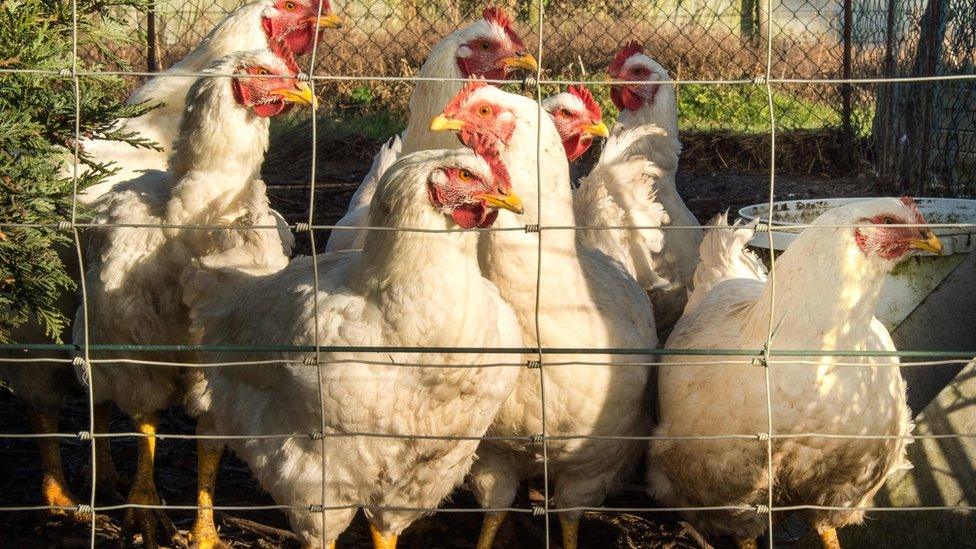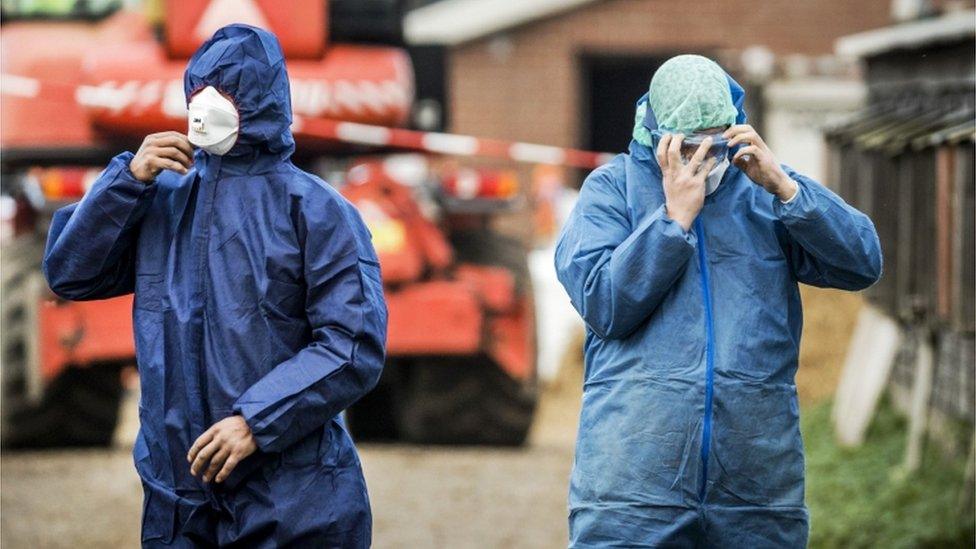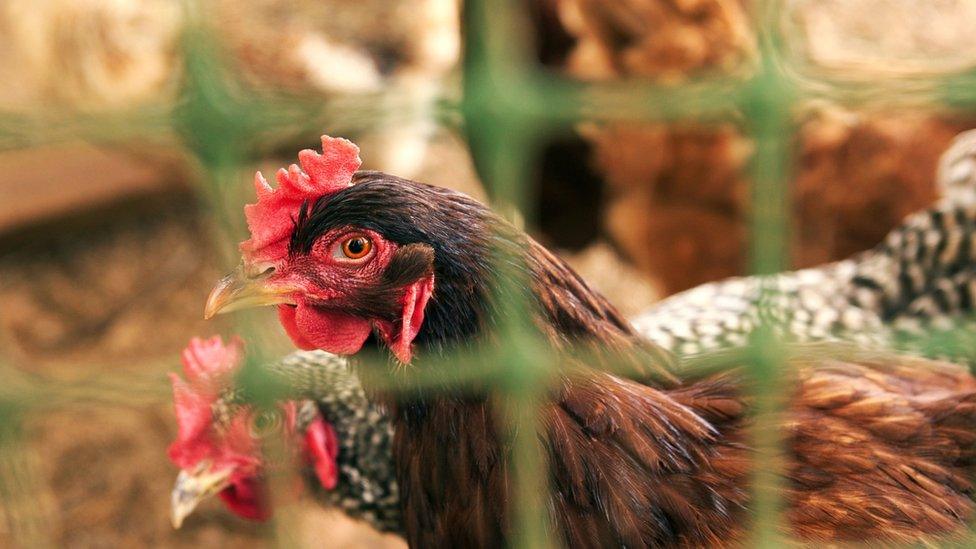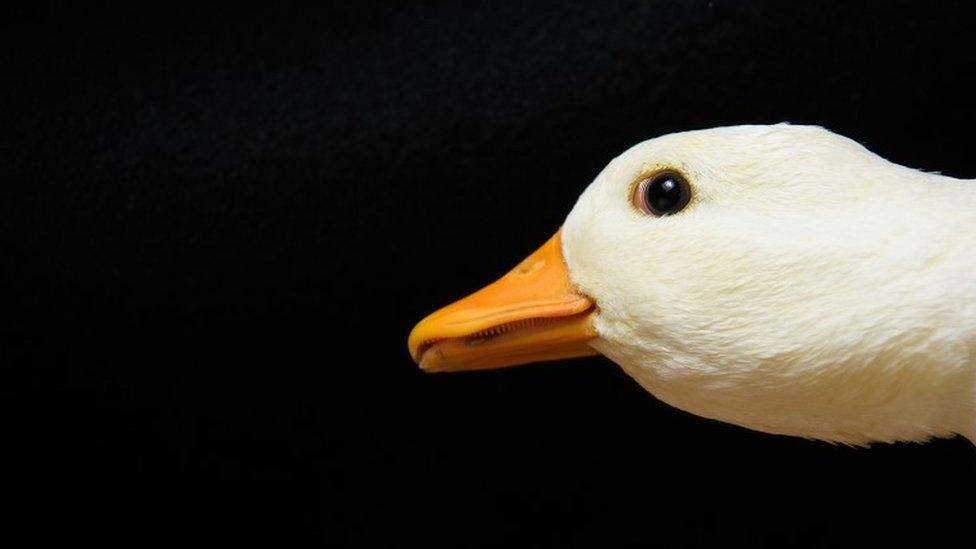'Keep poultry inside' amid bird flu risk, keepers told
- Published

Poultry keepers have been told to keep their birds inside to protect them from a highly-infectious strain of avian flu in Europe.
Chicken, turkey and duck owners must keep them indoors for 30 days or take steps to separate them from wild birds.
The H5N8 bird flu strain has been found in poultry and wild birds in 14 countries including Germany and France.
The government's chief vet Prof Nigel Gibbens said the risk to humans was low and no UK cases had been found.
The precautionary measures announced by the Department for Environment, Food and Rural Affairs (Defra) apply to farmers and anyone in England who keeps any birds, even those with a few chickens in their back garden.
Similar restrictions have been introduced in Scotland and Wales, but not Northern Ireland.
Farmers are being asked to look for signs of infection and to take robust disinfectant measures.
Members of the public are also being told to report cases of dead wild waterfowl - such as swans, geese and ducks - or gulls, or five or more dead birds of other species to Defra.
Defra said it had increased its surveillance, and keepers are being urged to make sure feed and water is not accessible to wild birds.
'Happy birds'
Daniel Brown, a chicken farmer from Cambridge with 40,000 hens in three sheds, said Defra had made the correct decision.
He told BBC Radio 4's Today programme: "We'll be shutting them in this morning. We'll be putting in extra toys for the birds - straw bales, empty bottles, cardboard boxes - anything to give them something else to think about.
"They love going outside, and now they can't for their own safety so we'll be doing anything we can just to keep the birds happy."
Government's chief vet tells Radio 4's Today big flocks are at risk of avian flu
Prof Gibbens said: "We are closely monitoring the situation across Europe and have scaled up surveillance in response to the heightened risk.
"As a precaution, and to allow time for poultry and captive bird keepers to put in place appropriate biosecurity measures, we have declared a 30-day prevention zone to reduce the risk of infection from wild birds."
Prof Gibbens said the disease can get into housed birds and urged farmers to increase and maintain their biosecurity.
John Fishwick, of the British Veterinary Association, said the fear was that as migratory birds, particularly water fowl, fly across Europe they have contaminated farms and caused outbreaks in commercial poultry.
Environment Secretary Andrea Leadsom urged bird keepers to adopt the measures to protect poultry,
In a written statement, she said: "In response to the risk to poultry and other captive birds, the chief veterinary officer yesterday put in place an Avian Influenza Prevention Zone.
"Defra has also enhanced its surveillance of wild birds, with particular emphasis on those species posing the greatest risk.
"This process will be kept under review and adjusted as necessary in the light of any changes in circumstances."
Christmas turkeys
The British Poultry Council said eggs could still be sold as free range because the measures were compulsory, and there was no threat to supplies of Christmas turkeys.
Chief executive Richard Griffiths welcomed the decision.
"The poultry industry has been liaising closely with Defra to ensure we are best prepared should the risk of bird flu heighten, and contingency plans are in place and under constant review," he said.
"Most birds can be taken inside their houses within a matter of hours. Where birds like geese and game can't be housed, measures will be put in place to ensure separation from wild birds.
"There is no risk to public health and this is a precaution based on a disease in birds."
Last month, 190,000 ducks were culled in the Netherlands to try to prevent the spread of bird flu across northern Europe.
- Published7 December 2016

- Published7 December 2016

- Published27 November 2016
